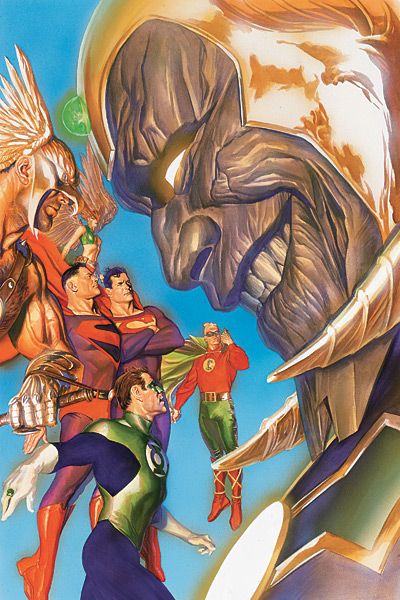"Justice Society of America" #17 is basically a comic book in which a dozen superheroes fly around a gigantic god-like creature and ponder the drawbacks and benefits of divine intervention. This immense character, Gog, who looks like a Jack Kirby monster but smiles beneficently, speaks in a 16-point font and grants wishes. He doesn't just bring water and vegetation to desiccated wastelands -- he's not just a macro-level helper -- he heals individuals as well, giving the disfigured Damage back his handsome face last issue, and, in this issue, he gives Dr. Mid-Nite back his vision and returns Starman's sanity.
Writer Geoff Johns, with plotting assistance from Alex Ross, seems to be questioning the role of a higher power. He's asking, in this narrative, "what is the price of getting your ultimate wish?" and "what is the relationship between humanity and the divine?" Being a comic book writer, Johns isn't asking these questions idly. He's putting them in action, literally embodied by Gog and his relationship to those around them. He's also challenging the god-like roles of the superhumans, and when Gog says to the JLA (who make a guest appearance in this issue), "You are protectors. Who protects you? Now I do," we understand the math involved. Gog is to Superman as Superman is to humanity. It's a matter of degree, but an important matter, to be sure.
It's rare to see a mainstream superhero comic deal so explicitly with religion, but Johns doesn't preach any particular doctrine. He seems more interested in exploring notions of faith and power and wish-fulfillment than he does in trying to promote or undermine anyone's belief system. In the previous "JSA" series, Johns emphasized Mr. Terrific's lack of faith -- the character was one of the few avowed atheists in comics, maybe the only one. In a DC Universe in which Heaven and Hell literally exist and gods and demons walk the Earth, it's difficult to maintain an atheistic outlook, and in this issue, Mr. Terrific admits that he has seen things science cannot explain and though he wishes he could believe in a higher power, he cannot. "Something inside won't let me," he says. It's difficult to read this as a pro-religion moment, since in Mr. Terrific's world, higher powers clearly exist, and he's silly to pretend they don't. And the insularity of Johns's exploration -- the idea that he's not examining faith in our world, but in the particular world of the DC Universe -- appeals to me. He's using the uncertainty of faith and the power of a god as character bits and plot points to tell a story. He's not making any heavy-handed points. This isn't allegory. The moral will probably turn out to be as simple as, "be careful what your wish for," but he allows his characters room to question, to doubt, to challenge, and to despair, and that makes for something a bit different on the superhero shelf.

